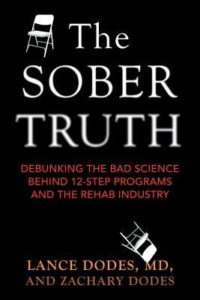
Image source: https://www.goodreads.com/book/show/18142416-the-sober-truth
Author Interviews – Newscast
by NPR Staff
3/23/2014
Excerpt:
Since its founding in the 1930s, Alcoholics Anonymous has become part of the fabric of American society. AA and the many 12-step groups it inspired have become the country’s go-to solution for addiction in all of its forms. These recovery programs are mandated by drug courts, prescribed by doctors and widely praised by reformed addicts.
Dr. Lance Dodes sees a big problem with that. The psychiatrist has spent more than 20 years studying and treating addiction. His latest book on the subject is The Sober Truth: Debunking the Bad Science Behind 12-Step Programs and the Rehab Industry.
Dodes tells NPR’s Arun Rath that 12-step recovery simply doesn’t work, despite anecdotes about success.
“We hear from the people who do well; we don’t hear from the people who don’t do well,” he says.
Interview Highlights
On Alcoholics Anonymous’ success rate
There is a large body of evidence now looking at AA success rate, and the success rate of AA is between 5 and 10 percent. Most people don’t seem to know that because it’s not widely publicized. … There are some studies that have claimed to show scientifically that AA is useful. These studies are riddled with scientific errors and they say no more than what we knew to begin with, which is that AA has probably the worst success rate in all of medicine.
It’s not only that AA has a 5 to 10 percent success rate; if it was successful and was neutral the rest of the time, we’d say OK. But it’s harmful to the 90 percent who don’t do well. And it’s harmful for several important reasons. One of them is that everyone believes that AA is the right treatment. AA is never wrong, according to AA. If you fail in AA, it’s you that’s failed.
On why 12-step programs can work
The reason that the 5 to 10 percent do well in AA actually doesn’t have to do with the 12 steps themselves; it has to do with the camaraderie. It’s a supportive organization with people who are on the whole kind to you, and it gives you a structure. Some people can make a lot of use of that. And to its credit, AA describes itself as a brotherhood rather than a treatment.
So as you can imagine, a few people given that kind of setting are able to change their behavior at least temporarily, maybe permanently. But most people can’t deal with their addiction, which is deeply driven, by just being in a brotherhood.
On a psychological approach to addiction
When people are confronted with a feeling of being trapped, of being overwhelmingly helpless, they have to do something. It isn’t necessarily the “something” that actually deals with the problem. … Why addiction, though — why drink? Well, that’s the “something” that they do. In psychology we call it a displacement; you could call it a substitute …
……………………………………………
View the complete article at:
https://www.npr.org/2014/03/23/291405829/with-sobering-science-doctor-debunks-12-step-recovery








